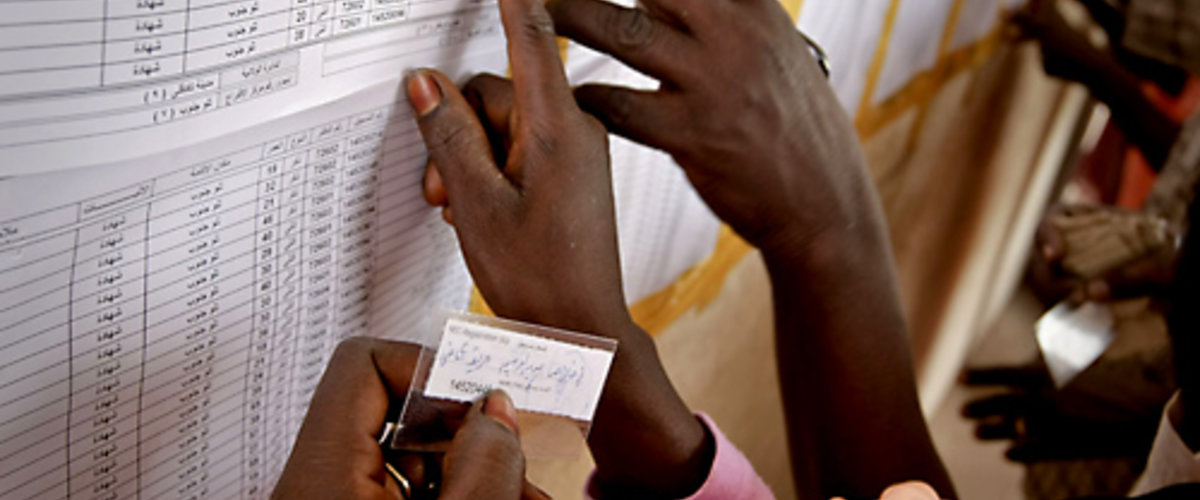Closure of UNMIS
UNMIS wound up its operations on 9 July 2011 with the completion of the interim period agreed on by the Government of Sudan and Sudan People’s Liberation Movement in the Comprehensive Peace Agreement (CPA), signed on 9 January 2005.
The mission ended its six years of mandated operations the same day South Sudan declared independence, following a CPA-provided referendum on 9 January 2011 that voted overwhelmingly in favour of secession.
In support of the new nation, the Security Council established a successor mission to UNMIS – the UN Mission in South Sudan (UNMISS) – on 9 July for an initial period of one year, with the intention to renew for further periods as required.
3 May
2011
3 May 2011 – Assia Osman looked closely at the voter register pinned up on a notice board at Tilou polling centre, just outside Kadugli town.
Running her finger from sheet to sheet, looking through hundreds of names written in Arabic, she seemed annoyed by any interruption. She just wanted to find her name on the list so that she could vote.
"It's important to me," Ms. Osman said. "We are living in a bad situation that we must change. We are suffering a lot."
All eyes seem to be on Southern Kordofan at the moment, if the media, scholars, diplomats and international community players paying attention to the state's elections are anything to go by.
They seem to look at the bigger picture, however – the special status of the state in the Comprehensive Peace Agreement (CPA) and what the outcome of the elections that started yesterday means for the future of Sudan. For the individual voter like Ms. Osman, though, it is a more personal event.
"We want to live in a secure place, and we have no water. We need someone who can bring us water," she said, elaborating on the "bad situation" she had mentioned, and then turned back to her name search.
A few metres away, Hamed Kuku walked through the dusty grounds at the polling centre, away from the voting booths. He flashed his forefinger drenched in purple ink, showing that he had voted, an exercise which, he said, was not at all new to him at 95 years of age.
Violence and war were not a new phenomenon either, said Mr. Kuku, who in addition to having lived through years of conflict in Southern Kordofan, also claimed to have fought in World War II with the Italian army.
"I want these elections to be peaceful," he said. "I also want them to bring some changes."
One urgent matter for Mr. Kuku was education for his grandchildren.
"Education is very expensive and yet important. I hope people will vote wisely," he said, and laughed knowingly when we asked if he would say who "his" wise choice had been.
"No! I won't tell anyone," he said, smiling and leaving the polling station, happy to get out of the mid-morning heat. So many of the people he had found in the queue were still waiting for their turns.
"It's an advantage of old age," he said gleefully. "They took me straight to the front when I arrived. I was here for less than an hour."
Political affiliations also seemed to be an advantage, as parties ferried their supporters to and from polling centres throughout the state.
At Murta polling centre, just out of Kadugli, women waited under a crowded tent for a truck to return them to their homes. They had completed their voting.
Rehmah Ahmad, a 45-year-old mother of six – the youngest 25 years old – seemed to want nothing specific from the election – just that things would get better.
"As women, we want everything," she said without going into detail.
This was not the first time she was voting, Ms. Ahmad said. And she saw nothing special about this particular election.
Thirty-year-old Kodi Kodi was a first-time-voter, though. He had spent many years away from his home in the Nuba Mountains, he said, studying public administration in Khartoum, but now had returned to vote because he believed this election would be a turning point for his state, people and party.
"But regardless of who wins, however, what the Nuba people need now is development in all sectors and security," he said. "We want to live in peace."
 UN
UN United Nations Peacekeeping
United Nations Peacekeeping





